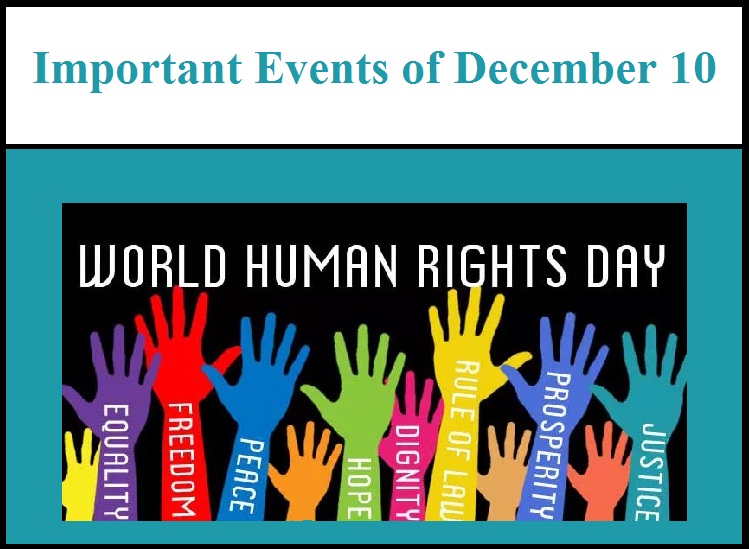Important Events of December – 10
World Human Rights Day
Human Rights Day is celebrated annually across the world on 10 December every year.

The date was chosen to honour the United Nations General Assembly’s adoption and proclamation, on 10 December 1948, of the Universal Declaration of Human Rights (UDHR), the first global enunciation of human rights and one of the first major achievements of the new United Nations. The formal establishment of Human Rights Day occurred at the 317th Plenary Meeting of the General Assembly on 4 December 1950, when the General Assembly declared resolution 423(V), inviting all member states and any other interested organizations to celebrate the day as they saw fit.
The day is normally marked both by high-level political conferences and meetings and by cultural events and exhibitions dealing with human rights issues. In addition it is traditionally on 10 December that the five-yearly United Nations Prize in the Field of Human Rights and Nobel Peace Prize are awarded. Many governmental and non-governmental organizations active in the human rights field also schedule special events to commemorate the day, as do many civil and social-cause organizations.
Nobel Prize Day

Alfred Nobel was born on 21 October 1833 in Stockholm, Sweden, into a family of engineers. He was a chemist, engineer, and inventor. In 1894, Nobel purchased the Bofors iron and steel mill, which he made into a major armaments manufacturer. Nobel also invented ballistite. This invention was a precursor to many smokeless military explosives, especially the British smokeless powder cordite. As a consequence of his patent claims, Nobel was eventually involved in a patent infringement lawsuit over cordite. Nobel amassed a fortune during his lifetime, with most of his wealth coming from his 355 inventions, of which dynamite is the most famous.
In 1888, Nobel was astonished to read his own obituary, titled The merchant of death is dead, in a French newspaper. As it was Alfred’s brother Ludvig who had died, the obituary was eight years premature. The article disconcerted Nobel and made him apprehensive about how he would be remembered. This inspired him to change his will. On 10 December 1896, Alfred Nobel died in his villa in San Remo, Italy, from a cerebral haemorrhage.
To Know All Daily Events – Click Here
Important Study Material PDF Download
For  Online Test Series Online Test Series | Click Here |
| To Subscribe | Click Here |
| To Join | Click Here |
| To Join | Click Here |

